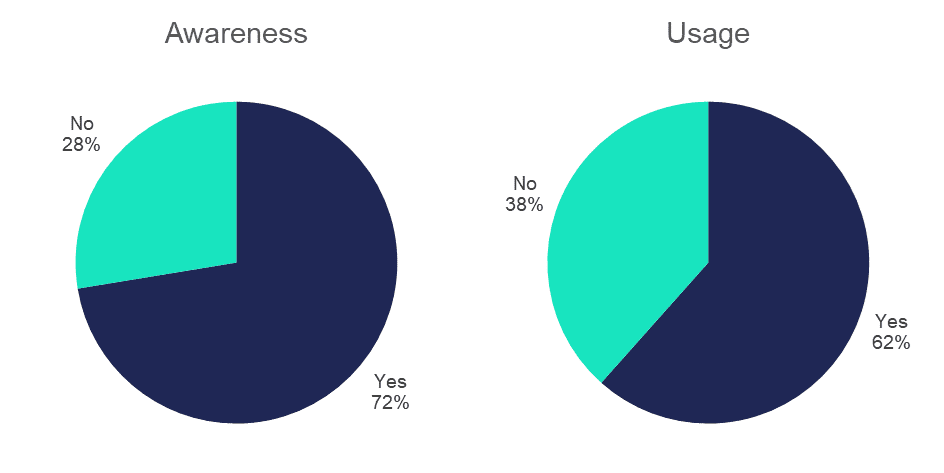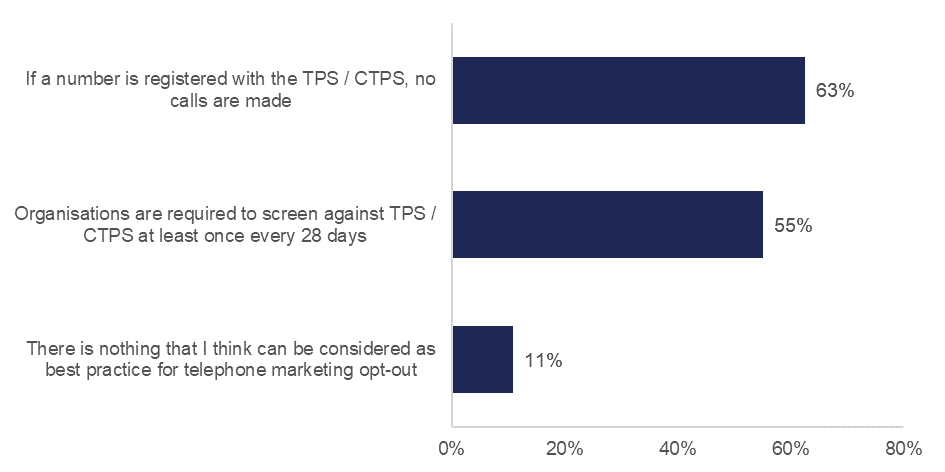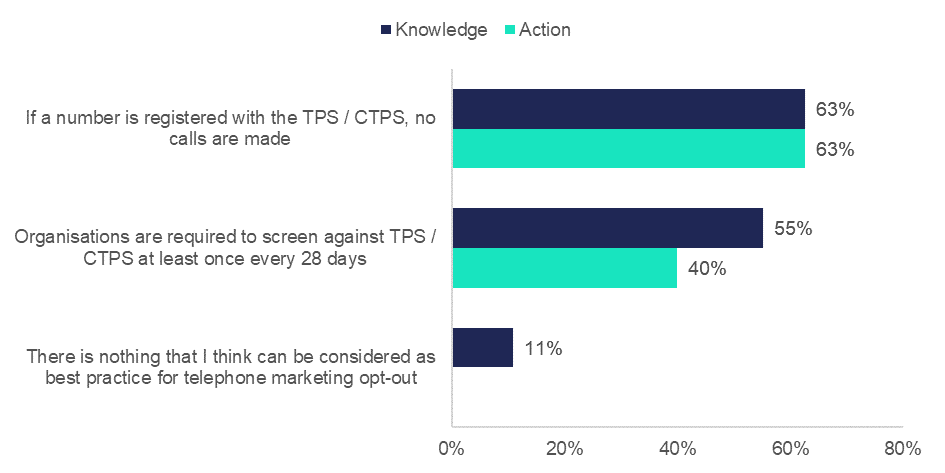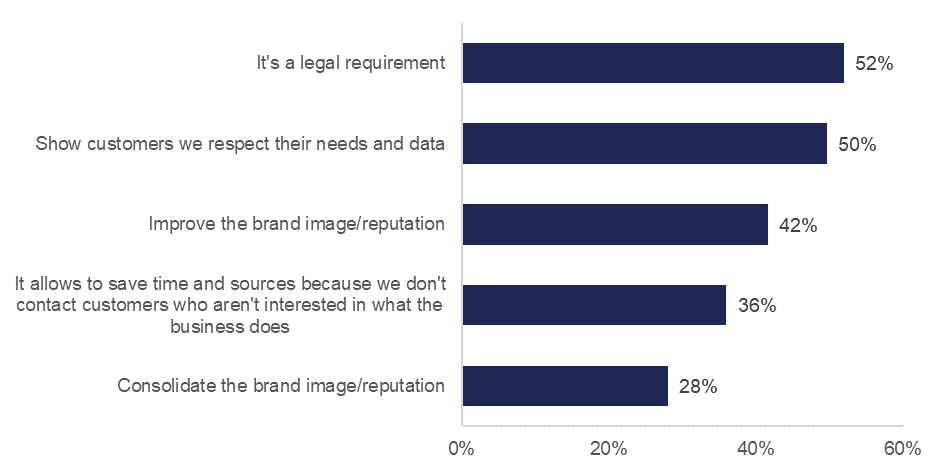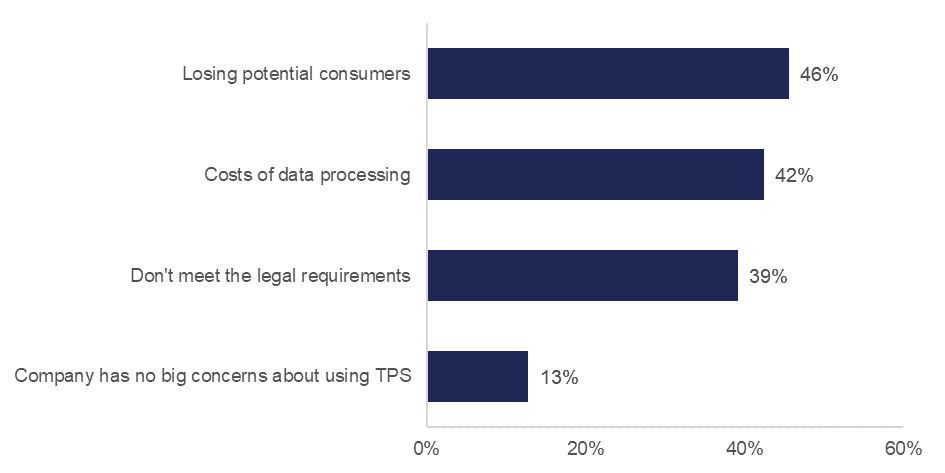
28th Mar 2022
TPS: What Marketers Say
Welcome to this short article series dedicated to the Telephone Preference Service (TPS).
The Telephone Preference Service (TPS) is the UK's only official "Do Not Call" register for landlines and mobile phone numbers. It allows people and businesses to opt out of unsolicited live sales and marketing calls.
It's free and quick to register a telephone number and doing so will reduce the number of unwanted sales and marketing calls consumers' receive. There is also a register for businesses, the Corporate Telephone Preference Service.
If a number is registered with the TPS (or CTPS), organisations are legally required - by the Privacy and Electronic (EC Directive) Regulations 2003 - to refrain from calling it. In the UK, the Information Commissioner's Office (ICO) enforces the law and has the power to fine firms that break it.
This article focuses on the findings of a survey conducted in July 2021 of over 200 UK-based marketers - further details can be found in the "Methodology" section at the end of the article. We asked them about their knowledge and experiences of opt-out services and the TPS specifically to gather insights from their direct experience.
To appreciate the whole story, we also asked consumers to share their awareness and knowledge - you can read the insights from this article here.
Telephone Preference Services- Knowledge
The majority (88%) of the surveyed marketers said they are aware companies making sales and marketing telephone calls have a legal requirement not to call anyone who has registered that they do not wish to receive such calls.
Before today, were you aware of these services? and Does your business use these services (either directly or via a third party)? (Please select one)
In all, 72% said they are aware of the TPS service, while just 59% said they were aware of its corporate equivalent (CTPS). When asked whether they believed their business actually used the service, just 62% reported this was the case for TPS - for CTPS this was 66%.
Telephone Preference Services - Experience
Encouragingly, almost two-thirds of marketers (63%) recognise that it’s good practice that, if a number is registered either with TPS or CTPS, no calls should be made. Similarly, 55% understand organisations are required to screen against TPS/CTPS at least once every 28 days.
What do you think can be considered as a best practice for telephone marketing opt-out, if anything? (Please select all that apply)
However, another perspective is that half of marketers aren’t aware of the best practices related to the TPS/CTPS services. For those that are aware, they also act on their knowledge and put these best practices in place.
What do you think can be considered as a best practice for telephone marketing opt-out, if anything? (Please select all that apply) and And which of the following activities does your company currently do, if any? (Please select all that apply)
Half of marketers use the TPS services because they consider it as a legal requirement (52%) and to show customers they respect their needs and data (50%). This, again, is slightly concerning given customers’ data should be treated with the highest care in order to build long-lasting relationships founded on trust.
Furthermore, only one in four (28%) believes that the TPS service would support them in consolidating their brand image and reputation.
What are the primary reasons for your business to use TPS? (Please select all that apply)
The main concerns businesses site to not use the TPS services are connected to their fear to lose potential customers (46%) and the costs of data processing (42%). Marketers shouldn’t fear data best practices or related services – as the regulations in place are there to safeguard both consumers and businesses.
Why has your business decided to not use TPS? (Please select all that apply)
What’s in it for the business?
To summarise, the benefits the TPS offers to marketers that decide to register their businesses are:
Ensuring trust with their consumer by contacting them on their terms
Save their business time and money
Avoid reputational and enforcement risk’
As mentioned in the introduction, we also asked consumers to share their awareness and knowledge – you can read the insights from this article here.
If this article has left you keen to learn more about the TPS and what it can offer to you and your business, visit the website.
Methodology
The research was conducted in July 2021 via an online survey of 203 marketers. The respondents were working in Senior roles (29%), Mid-level (50%) and Junior (22%) roles.
Further details on their organisations:
Region: 10% East of England, 29% Greater London, 8% East Midlands, 12% West Midlands, 3% North East, 11% North West, 5% Scotland, 7% South East, 5% South West, 3% Wales, 6% Yorkshire and the Humber
Business size: 38% Large (250+ employees), 40% Medium (50-250 employees), 16% Small (10-49 employees), 6% Micro (1-9 employees)
Business type: 31% B2B, 33% B2C, 36% Both
Sector: 40% working in the Advertising and Marketing sector and the remaining 60% working in other sectors.
The data was collected by Census Wide then analysed by the DMA Insight team.
The article was written and designed by the DMA Insight department.
Unless referenced, all data included in this article is taken from this survey.
If you have any questions about the methodology used in the article, you can contact the DMA’s Insight team via email: research@dma.org.uk.
Related events and webinars
Related courses & qualifications
NOT A MEMBER YET?
Join today
700+ organisations. 27,000 marketers. One mission.
We’re uniting the marketing world with our innovative and inspiring customer-first approach. We provide resources, training, and support to empower marketers to ensure responsible data use, meaningful connections and sustainable success.
